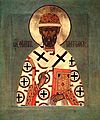1569 facts for kids
| Millennium: | 2nd millennium |
|---|---|
| Centuries: | 15th century – 16th century – 17th century |
| Decades: | 1530s 1540s 1550s – 1560s – 1570s 1580s 1590s |
| Years: | 1566 1567 1568 – 1569 – 1570 1571 1572 |
The year 1569 was a time of important changes and events, especially in Europe. New inventions, big battles, and the creation of a powerful new country all happened during this year. It was a time when maps got better, and different groups fought for their beliefs.
Contents
Key Events of 1569
England's First Lottery
From January 11 to May 6, England held its very first recorded lottery. This event took place at the St. Paul's Cathedral in London. People bought tickets, called "shares," for 10 shillings each. A shilling was a type of money used in England a long time ago. The money raised from this lottery was used to fix harbors and pay for other important public projects.
Battles and Conflicts in France
The year 1569 saw several major battles in France, part of the French Wars of Religion. These wars were fought between the Royalist troops (who supported the King and were mostly Catholic) and the Huguenots (French Protestants).
The Battle of Jarnac
On March 13, a big battle happened near Jarnac. Royalist troops, led by Marshal Gaspard de Tavannes, surprised and defeated the Huguenots. The Huguenot leader, the Prince of Condé, was captured and later died. However, a large part of the Huguenot army managed to get away, led by Gaspard de Coligny.
Huguenots Get Help
On June 10, the Huguenots received help. Protestant soldiers from Germany joined Coligny's forces near the city of Limoges. This helped them continue their fight.
The Siege of Poitiers
From July to September, Huguenot forces, still led by Coligny, tried to capture the city of Poitiers. A young Prince named Henry of Navarre, who was only 15 years old at the time, also joined the siege. To "besiege" a city means to surround it and try to take control.
The Battle of Orthez
On August 24, another important battle took place at Orthez. Huguenot forces, led by Gabriel de Montgomery, defeated the Royalist forces. The Catholic soldiers surrendered, expecting their lives to be spared. However, many of them were killed by the Huguenots despite the agreement.
Poitiers Siege Ends
In September, a Royalist army, led by the Duc d'Anjou (who would later become King Henry III) and Marshal Tavannes, forced Coligny to stop his siege of Poitiers. The Huguenots had to leave the city.
The Battle of Moncontour
On October 3, one of the biggest battles of the year happened at Moncontour. The Royalist forces, led by Tavannes and Anjou, once again defeated Coligny's Huguenot army. This was a major loss for the Protestants.
New Inventions and Countries
The Mercator Projection
In 1569, a mapmaker named Gerardus Mercator created a new way to draw maps called the Mercator projection. This new method made it easier for sailors to navigate the seas because it showed lines of longitude and latitude as straight lines. It was a very important invention for exploration and travel.
The Union of Lublin
This year also saw a major political event in Eastern Europe. Three regions of Lithuania – Volhynia, Ukraine, and Podlasie – voted to become part of Poland. This led to the Union of Lublin, where Poland and Lithuania officially joined together. They formed a powerful new country called the Polish-Lithuanian Commonwealth. This union created one of the largest and most diverse countries in Europe at the time.
Images for kids
-
July 1: Union of Lublin
-
October 3: Battle of Moncontour
-
Saint John of Ávila
See also
 In Spanish: 1569 para niños
In Spanish: 1569 para niños
 | Janet Taylor Pickett |
 | Synthia Saint James |
 | Howardena Pindell |
 | Faith Ringgold |







